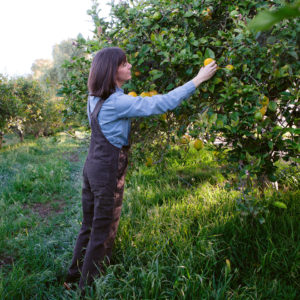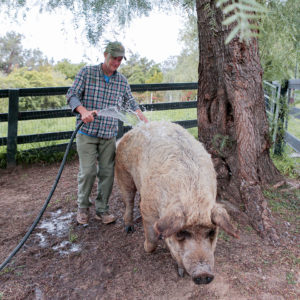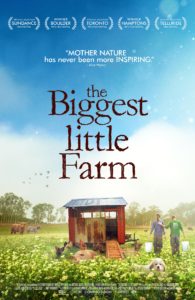by Flo Paris Oakes
“The earth is the Lord’s and everything in it…” Psalm 24:1
The Christian creation story begins with a God who formed everything from rock and sky to creeping insect to the largest whales in the sea and called these things good. Life in the Garden of Eden was abundant and glorious, and God gave humans the weighty responsibility of stewarding these good things. If stewardship means taking care of something on someone else’s behalf, what does it look like to properly steward God’s world?
 John and Molly Chester’s beautifully filmed documentary, “The Biggest Little Farm,” gives us a vivid picture of a well-stewarded place. With exquisite cinematography (think “Blue Planet” style footage of farm life) and thoughtful narrative, the Chesters show us how to tend, care, live and imagine as part of God’s good creation.
John and Molly Chester’s beautifully filmed documentary, “The Biggest Little Farm,” gives us a vivid picture of a well-stewarded place. With exquisite cinematography (think “Blue Planet” style footage of farm life) and thoughtful narrative, the Chesters show us how to tend, care, live and imagine as part of God’s good creation.
The steward sees the vision of the creator and invites others in to see that vision to fruition.
When the Chesters first arrive on their 200 acres, the land has been depleted by monoculture farming. The soil is hard and dead. There is no birdsong, no pollinator buzz, no life. But the Chesters hold on to a tenaciously hopeful vision of what the land is capable of, and they tend the land with that vision in mind.
They build healthy soil. They plant cover crops and diverse fruit trees. They bring in a variety of animals (sheep, chickens, pigs and a few precious Great Pyrenees pups as livestock guardians). And they invite others, including the late Alan York (biodynamic farming consultant) and people from all over the world to co-labor with them as they implement their vision.
The garden doesn’t grow overnight, but neither does God’s Kingdom—we wait and watch and act accordingly with the vision of what could be.
The steward lives in the tension of what is and what is to come.
Even in the midst of abundant life, there are still trials, and John and Molly make a point of embracing disharmony. Theirs is an honest look at agrarian life without the rosy glasses that some of us wear imagining life on a farm. Drought, predators, pests, and fire descend and threaten nearly every crop, animal, and hope they have for their farm.
For the Christian, this is a reminder that we live between “two gardens.” The utopian vision of Eden is past, and death and suffering and decay are ever present in our lives. Still, the second garden is coming—a flourishing and biodiverse landscape where suffering is no more and in which God himself promises to wipe away every tear from our eyes (Rev 21:4).
But this is not license to disengage with what is happening in the here and now.
The steward neither withdraws nor dominates.
Some theology teaches that since a “new creation” is coming, our actions here don’t matter—that we can disengage until we get to heaven, where our real life finally begins. But this faulty thinking has lead to all kinds of destruction for both human and non-human creation. Some theology says that our role as humans is to wrangle creation into submission, but this is also harmful.
In a pivotal moment of the film, John shoots a coyote that had been threatening his chickens. Soon after, in a moment he describes as the death of his “uncompromising idealism,” he realizes that in order to totally control the coyotes, he would have to kill each and every one. More importantly, he realizes that the coyotes have actually been aiding in keeping rodent populations at bay and that removing them from the ecosystem would upset the balance.
Sometimes as stewards, our ideas are not good ones. We must admit where we have harmed creation (including one another) whether intentionally or unintentionally, ask forgiveness, and find another way.
Still, we don’t watch from a distance or disengage. We get into it and get our hands dirty. We plant and hope and make mistakes and learn and try again. Jesus tells us that his Kingdom is in our midst (Luke 17:20-21). We can’t withdraw from it, we can’t control it, but we can engage in it. With every small action (planting one seed, loving one person), we can co-labor with Christ as his redemption rolls in, paying attention to where it has already filled the cracks and crevices of creation.
The steward pays attention.
How did John and Molly come up with the idea to set their ducks loose on the snails that had been decimating their orchard? How did they find out that the coyotes had actually been keeping the gophers and other rodent pests at bay?
They paid attention.
John’s unique position as a storyteller and a photographer probably helped, but this is a lesson for all good stewards. Paying close attention to what is happening around us, watching the story unfold without agenda, listening to others instead of centering ourselves, and simply observing the details are wise and loving practicing of the good steward.
Ultimately, where your attention is, there also is your affection.
The good steward loves the gift.
 The very first job God gave Adam in the garden was to name all of the plants and animals. I can’t imagine this is because God was just worn out from creating. Perhaps he knew that, if Adam gave a creature something as intimate as a name, he would know it, love it, and care for it well.
The very first job God gave Adam in the garden was to name all of the plants and animals. I can’t imagine this is because God was just worn out from creating. Perhaps he knew that, if Adam gave a creature something as intimate as a name, he would know it, love it, and care for it well.
There is a scene in The Biggest Little Farm where John stays up all night with a mastitis infected pig. When she makes it through the night, he spends the following days trying to get her to eat until finally he realizes (because he pays close attention) that her newborn piglets might just give her a reason to live. He puts them back in the pen with her where they all oink and squeal until she finally gets up and eats. This is just one pig (not a huge commodity for the farm), but John reveals earlier that this pig had a name—Emma. And John stewards Emma, this good creation of God, with love.
***
At the end of the film (and seven years after they first set foot on their farm), we see the place that had existed in John and Molly’s imaginations—a flourishing landscape rich in biodiversity where the farm both benefits from and provides habitat for pollinators and diverse wildlife. That dead, gray earth from before is transformed into rich soil containing billions of microorganisms in just one handful.
John and Molly are good stewards over their 200 acres, but theirs is just one story.
You may not have 200 (or even two) acres to cultivate, but you can support your local farmers who are doing this good work. You can get to know the native species around you—the birds, the trees, the flowers, the rivers—and learn their names. You can make one small change in hour household or your workplace or your church and cast a vision for what could be. You can write a story or paint a picture or you can point to that beautiful sunset and simply say, “look at that!” There are a hundred ways you can meaningfully impact and steward the place where you are. But in order to love, in order to care, you must first pay attention.
O merciful Creator, your hand is open wide to satisfy the needs of every living creature: Make us always thankful for your loving providence; and grant that we, remembering the account that we must one day vive, may be faithful stewards of your good gifts; through Jesus Christ our Lord, who with you and the Holy Spirit lives and reigns, one God, for ever and ever. Amen. (Book of Common Prayer)
 The Biggest Little Farm is currently playing in theaters. Learn more.
The Biggest Little Farm is currently playing in theaters. Learn more.








Add a Comment